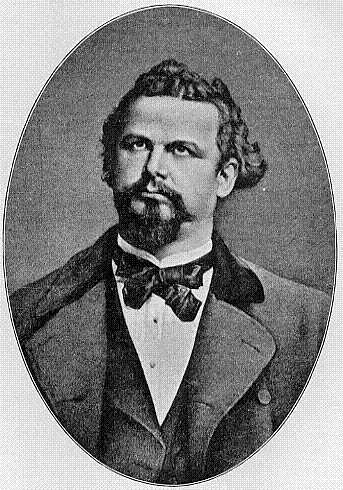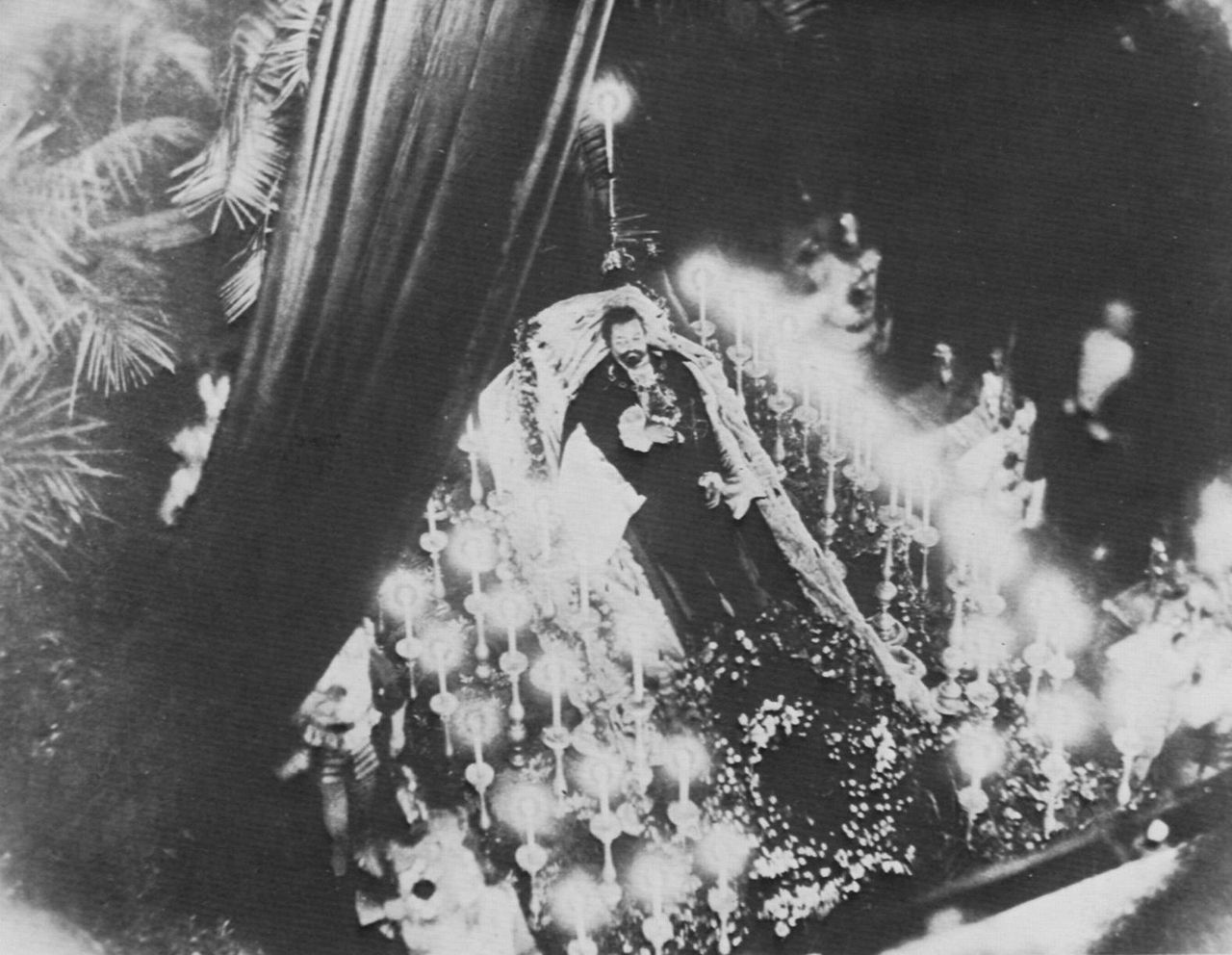by Scott Mehl © Unofficial Royalty 2016
Kingdom of Bavaria: The House of Wittelsbach ruled as Dukes, Electors, and Kings of Bavaria from 1180 until 1918. Today Bavaria is a landlocked federal state of Germany, occupying its southeastern corner. Maximilian IV Joseph, Prince-Elector of Bavaria allied his electorate with Napoleon and adopted many of the French beliefs of the Enlightenment. It was this loyal service to Napoleon through which Maximilian’s electorate was created the Kingdom of Bavaria with Maximilian at its king. He officially became the Maximilian I Joseph, the first King of Bavaria on January 1, 1806. On November 13, 1918, King Ludwig III would be the first monarch in the German Empire to be deposed at the end of World War I, bringing an end to 738 years of rule by the Wittelsbach dynasty.
********************

King Ludwig II of Bavaria; Credit – Wikipedia
King Ludwig II of Bavaria (Ludwig Otto Friedrich Wilhelm) was born on August 15, 1845, at Nymphenburg Palace in Munich, Kingdom of Bavaria, now in the German state of Bavaria. He was the elder of two sons of King Maximilian II of Bavaria and Princess Marie of Prussia. He was named after his grandfather, the reigning King Ludwig I of Bavaria as the two shared a birthday, which was also the feast day of Saint Louis IX of France, the patron saint of Bavaria.
Ludwig had one younger brother who succeeded him:
- King Otto of Bavaria (1848 – 1916) – unmarried
Ludwig was raised primarily at Hohenschwangau Castle in Hohenschwangau in southwestern Bavaria by servants and tutors. His education was very strict, and he showed an early interest in art and literature. Neither Ludwig nor his brother were very close with their parents and were much closer to their grandfather King Ludwig I. At an early age, Ludwig developed a close friendship with Prince Paul of Thurn und Taxis who served as his aide de camp, as well as with his first cousin once removed Duchess Elisabeth in Bavaria (the future Empress Elisabeth of Austria), with whom he would remain very close for his entire life.

Ludwig and his fiancée, 1867. source: Wikipedia
King Ludwig never married, but in January 1867, he became engaged to his first cousin once removed Duchess Sophie Charlotte in Bavaria. Sophie was the younger sister of Ludwig’s close friend Duchess Elisabeth. After postponing the marriage several times, Ludwig eventually broke the engagement in October of the same year. Most historians believe that Ludwig was actually gay, although he struggled to suppress his desires due to his strong Catholic faith.
Ludwig was just 18 years old when he became King of Bavaria upon his father’s death on March 10, 1864. He continued with his father’s policies and retained his ministers, but his interests were not in ruling the country. His interests lay almost solely in the arts. Soon after becoming King, he established a new Court Theater (now the Staatstheater am Gärtnerplatz) and began a lifelong project of constructing numerous palaces and castles. He strongly disliked public functions and formal social events, and by 1876 had largely withdrawn from public life. Despite this, and the tension it caused among his ministers, Ludwig remained very popular with the Bavarian people.
His reign saw Bavaria’s defeat in the Austro-Prussian War of 1866, having sided with Austria. After the war, Bavaria was forced to enter into a mutual defense treaty with Prussia. Four years later, the country was forced to side with Prussia in the Franco-Prussian War. In late 1870, Bavaria joined the North German Confederation, losing its status as an independent Kingdom, but retaining a much more privileged status than many other constituent states.
In December 1870, King Ludwig was coerced into endorsing the creation of the new German Empire. Despite his endorsement, Ludwig was strongly opposed to the creation of the German Empire and refused to attend the proclamation ceremony held at the Palace of Versailles. In his place, he sent his brother Otto and his uncle Luitpold.

Richard Wagner, 1871. source: Wikipedia
By 1871, Ludwig spent most of his time pursuing his interests in the arts, music, and architecture. At a very young age, he first saw an opera by famed composer Richard Wagner and became enthralled with his work. Shortly after becoming King, he summoned Wagner to court and became his primary patron. Many credit King Ludwig’s support for establishing Wagner’s career and legacy. When Wagner was forced to leave Munich in 1865, the King considered abdicating to follow him into exile, but Wagner insisted that he remain. Ludwig provided Wagner with a home in Switzerland and continued to support him from afar. Eventually, Wagner returned and the relationship between the two continued. Along with Wagner, King Ludwig supported many other artists and saw over 200 private performances of plays ballets, and operas in the court theaters.
Besides his interest in the arts, King Ludwig is probably best known for his love of architecture. Using his personal funds, he built several magnificent palaces and castles, the most famous being Neuschwanstein Castle.

Neuschwanstein Castle, c1900. source: Wikipedia
Neuschwanstein Castle was built near Hohenschwangau Castle where Ludwig spent much of his youth and was dedicated as a tribute to Richard Wagner. The cornerstone was laid in 1869 and construction went on for many years. It was not until 1884 that King Ludwig was able to take up residence in the still unfinished castle. Other projects included Linderhof Palace, Herrenchiemsee, and the royal apartment at the Munich Residenz.
By 1885, Ludwig was millions of marks in debt due to his spending on his castles and palaces and had all but withdrawn from his duties as King of Bavaria. Several of his government ministers began trying to find grounds to depose him, believing him to be mentally ill. Ludwig’s uncle Luitpold agreed to become Regent, provided the ministers could reliably prove that Ludwig was unfit to rule. In early 1886, a medical report was drawn up, listing a string of bizarre behavior, Ludwig’s unwillingness to deal with state business, and many other supposed examples of his mental instability. In June 1886, the report was completed and signed by several psychiatrists including Dr. Bernhard von Gudden, the chief of the Munich Asylum. None had met Ludwig except von Gudden, who met him one time, nearly twelve years earlier.

King Ludwig, c1882. source: Wikipedia
On the morning of June 10, 1886, Dr. von Gudden and several others arrived at Neuschwanstein to present Ludwig with a document of deposition. Ludwig had been made aware of the situation by a servant and ordered the castle to be surrounded by the local police. That same day, Ludwig’s uncle Luitpold was proclaimed Prince Regent. The commission returned again on the morning of June 12, and Ludwig was taken to Berg Castle on Lake Starnberg in Berg, Bavaria.
The following day, June 13, 1886, Ludwig went for a walk on the grounds of Berg Castle, accompanied by Dr. von Gudden and several attendants. Ludwig and the doctor went out again that evening without attendants but never returned. Several hours later, King Ludwig II’s and Dr. von Gudden’s bodies were found in the water of Lake Starnberg.
King Ludwig II’s death remains a mystery. It was ruled a suicide by drowning, but no water was found in his lungs during an autopsy. One belief is that Ludwig was murdered while trying to escape and another is that he died of natural causes, possibly due to the extremely cold temperature of the water.

King Ludwig II lying in state, June 1886. Source: Wikipedia
After laying in state in the royal chapel at the Munich Residenz in Munich, Kingdom of Bavaria, now in Bavaria, Germany, a grand funeral was held, and his remains were interred in the crypt of the Michaelskirche in Munich. In keeping with tradition, his heart was entombed at the Shrine of Our Lady of Altötting in Altötting, Bavaria. He was succeeded as King by his brother, Otto. However, Otto had also been declared mentally ill – also by Dr. von Gudden – and so their uncle Luitpold remained Prince Regent.

Tomb of Ludwig II, King of Bavaria; Photo Credit – © Susan Flantzer
This article is the intellectual property of Unofficial Royalty and is NOT TO BE COPIED, EDITED, OR POSTED IN ANY FORM ON ANOTHER WEBSITE under any circumstances. It is permissible to use a link that directs to Unofficial Royalty.
Bavaria Resources at Unofficial Royalty
